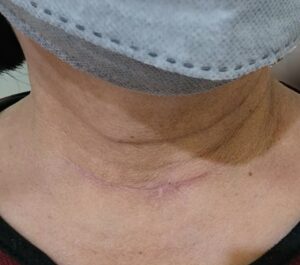Undergoing a thyroidectomy can be an overwhelming experience, and it’s natural to be concerned about the potential complications that may arise. While there are risks associated with any surgical procedure, it’s important to understand that most complications after thyroidectomy are rare. These complications can also be avoided or promptly managed by choosing an ENT doctor and head and neck surgeon and surgical team who will provide you with proper care and attention.
In this blog, you will read about the thyroidectomy procedure, and the potential complications that can arise from the surgery. It is important for patients to have all the information before undergoing any neck surgery and make informed decisions about their health.
What Is A Thyroidectomy?
A thyroidectomy is a surgical procedure to remove all or part of the thyroid gland. The thyroid gland is a butterfly-shaped gland located in the neck that produces hormones that regulate metabolism. (To read more about the thyroid gland, read here.) Your ENT doctor may advise you to undergo a thyroidectomy if you have a thyroid condition, such as thyroid cancer, goiter, or an overactive thyroid gland that does not respond to other treatments. (To know if you really need a thyroidectomy, read here)

How Minimal is the Risk of Complications in Thyroidectomy?
The risk of complications during and after thyroidectomy is relatively low, with most studies reporting a complication rate of less than 5%, with a range of 3-20 percent.
However, as with any surgical procedure, there is always a risk of complications, and it is important for the patient to be aware of these potential risks.
What are the Potential Complications of Thyroidectomy?
Hoarseness
There are 2 important nerves that are closely related to the thyroid. These are the 1. Recurrent laryngeal nerve (see yellow arrow in picture below) which controls the vocal cords which is responsible for producing your voice, and 2. The superior laryngeal nerve, which controls the pitch of your voice. These 2 nerves only have a diameter of less than 1 millimeter, and are located underneath the thyroid gland.

Hoarseness or voice changes can occur if these 2 nerves are damaged during the surgery. It is important to choose a qualified ENT surgeon to make sure that these 2 nerves are identified, and preserved during thyroid surgery. With expert technique, post-operative hoarseness is rare, occurring in less than 1% of thyroidectomies, and usually resolves on its own within a few months.
Hypocalcemia
The body’s calcium levels are regulatedby the parathyroid glands. These are usually 2 pairs of oval, golden brown glands (blue arrow in the picture above) which are located on the underside of both thyroid lobes. Hypocalcemia (or low calcium levels) can occur if these parathyroid glands are damaged or removed during the surgery. Your ENT surgeon will do a meticulous dissection to separate these glands from the thyroid gland and avoid hypocalcemia.
Symptoms of hypocalcemia include tingling in the fingers and around the mouth, muscle cramps, and spasms. It is important to inform your doctors and nurses if you have these symptoms for prompt calcium correction. Your endocrinologist will easily correct your hypocalcemia with intravenous calcium drip or calcium supplements.
Bleeding
Thyroid surgery is an elective surgery, so all blood workups are done to make sure that your clotting parameters are normal. However, bleeding can occur during or after the surgery. This is easily controlled with proper operative technique and hemostasis. Very rarely, bleeding may occur after thyroid surgery. This is usually an emergency and may require additional surgery to control the bleeders. This complication is relatively rare, occurring in less than 1% of thyroidectomies.
Anesthesia Complications
Complications related to anesthesia, such as allergic reactions or breathing difficulties, can occur during the surgery. These complications are rare but can be serious, so it is important to discuss any concerns you may have with your anesthesiologist. Inform your surgeon and anesthesiologist as well if you have had problems in your previous surgeries and if you have allergies to pain medicine.
Scar
A scar will be left in your neck after the surgery. With proper post-operative care, most scars heal well and become barely noticeable over time. (see picture of a thyroidectomy scar 2 months after surgery)
Inform your ENT surgeon if you are prone to keloid or hypertrophic scarring. Additional treatments such as scar ointments, and even steroid injections may be done by your ENT surgeon if there is a risk of keloid formation.

Seroma
A seroma is a collection of fluid that can occur under the skin after surgery. Your ENT doctor may leave a drain in your neck for a few days, and apply pressure dressing. With proper post-operative care, this complication is relatively rare, occurring in less than 2% of thyroidectomies.
Difficulty in Swallowing
Difficulty in swallowing may occur after thyroid surgery. Your team will give you proper pain medications after your surgery to control the pain. This difficulty in swallowing will usually get better in the first 3 days after surgery. You might have soft diet a few days after surgery and your regular diet when you can tolerate it. Inform your ENT doctor if your pain tolerance is low so proper pain control will be given to you after the procedure.
Conclusion
In conclusion, while complications from thyroidectomy are relatively rare, they can occur. It is important to be aware of the potential risks before undergoing the surgery to make an informed decision .
However, it is essential to remember that these complications are avoidable by choosing an expert ENT doctor and head and neck surgeon to perform the procedure. Your ENT doctor will discuss the potential risks and benefits of thyroidectomy and will work with you to develop a personalized treatment plan that meets your individual needs.
Before, during, and after surgery, you will have a whole team dedicated to make sure that your thyroidectomy goes smoothly. Please don’t hesitate to ask any questions you may have, and remember that we are here to support you every step of the way.
Experience expert ENT surgical care tailored to your needs.
Book now to schedule your appointment with our skilled thyroid surgeon in Palawan now and take the first step towards a healthier you.
Your well-being is our top priority.

